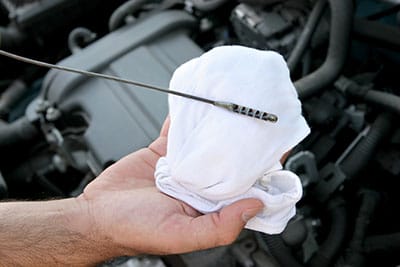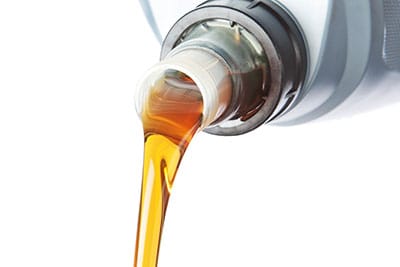Free Instant Quote
Professional Oil Change in Mesa, AZ
Every vehicle manufacturer specifies a different oil type suitable for each car, and the type varies further between diesel and gasoline engines. Nonetheless, the process of changing the oil is the same regardless of the vehicle’s make, model, or engine type.
During a professional oil change, the mechanic will:
- Replace your vehicle’s motor oil with the type recommended by your manufacturer.
- Properly dispose of the old oil filter and fit a new one.
- Inspect all other filters, such as the cabin and air filters.
- Top up any other essential fluids your vehicle requires.
This service might seem simple, but engine oil is critical to the operation of your vehicle. If overlooked, insufficient oil maintenance can lead to significant engine problems
 Why Engine Oil Is Crucial
Why Engine Oil Is Crucial
Over time, engine oil breaks down. With continual exposure to heat, moisture, and air, oil loses its efficacy, becoming thick and sludgy. This breakdown prevents the oil from being pumped efficiently around the engine’s internal components, increasing wear and tear.
The following are important parts used to pump oil around the engine:
- Oil Pan: This is where the oil is stored before circulating through the engine.
- Oil Pump: This critical component maintains the pressure to distribute oil throughout the engine. A malfunction here prevents the oil from circulating, causing the engine to overheat and become poorly lubricated.
- Oil Filter: Traps harmful debris and metal fragments that may enter the oil system.
Signs You Need an Oil Change
- Dark and Dirty Oil: Clean oil is typically amber in color and somewhat translucent. As it gets used, it collects particles from the engine and becomes darker. If the oil on the dipstick is dark and gritty, it’s time to change it.
- Engine Noise and Knocking: Oil provides a protective layer between engine parts, reducing metal-to-metal contact and quieting the engine. If your oil isn’t doing its job properly, the engine noise might increase. You might hear knocking or rumbling sounds, which suggest that the oil is no longer providing adequate lubrication.
- Oil Change or Check Engine Light: The most obvious sign that your vehicle needs an oil change is when the oil change light on your dashboard lights up. Additionally, the check engine light might also come on if your oil levels are too low or if the oil is too dirty.
- Oil Smell Inside the Car: If you smell oil inside the car, it could be a sign of an oil leak. If the smell is accompanied by exhaust fumes or the scent of gas, it’s important to get the vehicle inspected, as these could be signs of serious problems.
- Exhaust Smoke: It’s normal for vehicles to release a translucent vapor from the exhaust, but if you notice smoke coming out of your vehicle’s tailpipe, it might indicate an oil leak or faulty engine parts.
- Excessive Mileage: If you can’t remember the last time you changed your oil, it’s probably time to do so. Exceeding the manufacturer’s recommended oil change intervals can lead to accelerated engine wear and other problems.
- Decreased Performance: If your car seems to be running differently, such as experiencing a reduction in power, stalling, or rough running, it might be due to old or insufficient oil.
How to Check Your Oil
- Ensure your car is parked on a level surface to get an accurate dipstick reading.
- Allow the engine to cool fully to avoid burns and ensure the oil settles.
- Remove the dipstick, wipe it off with a clean cloth or paper towel, then reinsert it fully.
- Pull the dipstick out again to check the oil level, which should be between the indicated minimum and maximum marks.
- Check the oil’s appearance on the dipstick; a milky, creamy texture indicates moisture presence, which could also point to more serious issues.
- Add oil if necessary, checking the level with the dipstick to ensure proper filling.
- Replace the oil cap securely after adjustments.
Why Have a Professional Mechanic Change Your Oil
While some people opt to change their own oil, having a professional mechanic perform the task offers several benefits. These include:
- Expertise: A professional mechanic has the knowledge and experience to handle your vehicle’s specific needs properly. They are trained to identify potential issues and make necessary adjustments during the oil change process.
- Quality Products: Professional mechanics have access to high-quality motor oils and filters that may not be readily available to consumers. They also know which products are best suited for your vehicle’s engine, ensuring optimal performance and longevity.
- Time-Saving: A professional oil change can be completed in a relatively short amount of time, allowing you to continue with your day without disrupting your schedule. Additionally, mechanics can perform other routine maintenance tasks while changing your oil, saving you even more time.
- Proper Disposal: Improperly disposing of old motor oil and filters can harm the environment. Professional mechanics have the necessary facilities and procedures in place to dispose of these items safely and responsibly.
- Record Keeping: When a professional mechanic changes your oil, they record the service for future reference. This helps you stay on top of regular maintenance and provides proof that your vehicle has been properly cared for, which may come in handy if you ever need to file a warranty claim.
How Often Should You Change Your Oil
The frequency you should change your vehicle’s oil varies based on several factors, including the type of oil used and your driving habits. It is best to refer to your vehicle’s owner’s manual for specific guidelines.
Traditionally, it is recommended to change your oil every 3,000 miles or every 3 months, whichever comes first. This rule is particularly applicable to older vehicles or those that use conventional oil.
Many newer vehicles, especially those using synthetic oil, can go much longer between oil changes. Manufacturers often recommend intervals from 5,000 to 15,000 miles, depending on the vehicle and oil type. It’s important to consult your vehicle’s owner manual for specific recommendations.
If you frequently drive in harsh conditions, such as extremely hot or cold climates, stop-and-go traffic, or low speeds over short distances, you should change your oil more frequently. These conditions can cause your oil to break down faster than normal.
WE BRING THE GARAGE TO YOU
Our mobile mechanics bring the garage to you, equipped with all the necessary tools and equipment to perform any repair or maintenance service on-site. Whether you're at work, home, or stuck on the side of the road, our team is just a phone call away.
Contact Us for Easy, Convenient Mesa, AZ, Oil Change Service
Let us bring the convenience of an oil change directly to you anywhere in Mesa. Our mobile oil change services let you enjoy auto services wherever you are. No need to wait in line or waste time driving to an oil change service center.
Simply book an appointment, and our skilled technicians will arrive on time, ready to service your vehicle. Our services are efficient, cost-effective, and performed with the highest level of expertise.
Book your appointment today!


 Why Engine Oil Is Crucial
Why Engine Oil Is Crucial